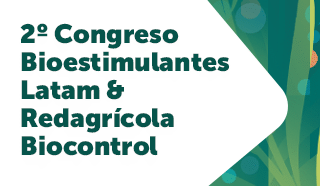10/Mar/2022
#03
SUBSCRIBE TO OUR NEWSLETTER
Suscríbete a nuestro newsletter
Last issue articles
- Biome: the space gaining protagonism in biological strategies for crops
- The export dynamics driving the Mexican biologicals market
- New model developed to evaluate effects of two or more biostimulants combined in a single crop
- Dr. Wagner Bettiol and the biocontrol market in Brazil
- Las propiedades que hacen del Trichoderma un socio clave en la búsqueda de mejores desempeños en los cultivos
- Changes in the new regulation on fertilizers and biostimulants in Chile
- Innovak Global, the expansion of root specialists
Market movers
- Renewable-based nitrogen fertilizer firm raises US$ 20 million in investment round
- Bayer and Ginkgo Bioworks close agreement to strengthen open innovation platform for agricultural biologics
- Argentinean firm Puna Bio: Millions raised to study superbacteria for agricultural use
- Corteva Agriscience signed an agreement to acquire leading biologics company Symborg
- Brazilian study uncovers ants' potential in crop protection
- Huber acquires specialty plant nutrition producer Biolchim
- UPL announces agreement to distribute bioprotector based on orange oil
- ICL and Lavie Bio start strategic collaboration to develop new biostimulants
- Hortitool and Green Smile to organize the Morocco Berry Conference 2022
Brazilian BP Bunge Bioenergia will extend the use of biofertilizers to all its sugar cane fields
Brazilian sugar cane will receive a boost from biological fertilizers. This is what the company BP Bunge Bioenergia from São Paulo is looking for, which announced that it is expanding the use of bio-fertilizers and biological pest control. The objective is to help the plant to reach its maximum genetic potential, reducing the risk of losses and reaching higher yields.
The biofertilizer Azospirillum brasilense, widely used in corn crops, is among the options adopted. The bacterium accelerates sugarcane development, prevents nutritional stress and diseases, and reduces climate impact. In doing so, the company seeks to increase sugarcane field yields (measured in tons of sugar per hectare) and save costs with nitrogen fertilizers.
The substance was tested on 37,000 hectares in the 2020/21 campaign and, according to BP Bunge, the results were positive. Thus, the biofertilizer will be applied to all the production expected to be harvested in 2022/2023, according to the firm which is a joint venture between the agricultural Bunge and the energy firm BP, to produce ethanol, from sugar.
“Los buenos niveles de productividad requieren inversiones que van más allá de lo básico en el cuidado de los cultivos, y esto implica innovación, investigación y tecnología. La alta productividad es el resultado de la combinación de una buena fertilización con el control de plagas y otras herramientas, como los bioestimulantes”, dice el director agrícola de BP Bunge Bioenergia, Rogério Bremm.
Also focused on reducing the use of chemical fertilizers and pesticides, the company has incorporated new biological control technologies to the field management. One example is the use of drones to apply the larvae of the Cotesia flavipes wasp, which feeds on the sugarcane borer.
According to the company, aerial distribution, which follows geo-referenced planning to achieve the greatest efficiency in localization, has generated results. One of them is the reduction of the distribution time of the biological agent, which can vary from 15% to 20% in relation to the manual system.
“Los drones han ido ganando cada vez más funcionalidad en el mantenimiento de los cultivos. La lucha contra las plagas es una de ellas. En el proceso diario de evolución de la gestión del campo, la tecnología desempeña sin duda un papel esencial, mejorando la productividad, la calidad, promoviendo el ahorro de recursos financieros y medioambientales”, valora Rogério Bremm.
With 11 units located in the Southeast, North and Midwest regions of Brazil, and over 10,000 employees, BP Bunge Bioenergia has an annual crushing capacity of 32 million tons of sugarcane. In addition, it is capable of producing over 1.5 billion liters of ethanol, 1.1 million tons of sugar and exporting 1,200 GWh of energy to the Brazilian power grid.
Last issue articles
- Biome: the space gaining protagonism in biological strategies for crops
- The export dynamics driving the Mexican biologicals market
- New model developed to evaluate effects of two or more biostimulants combined in a single crop
- Dr. Wagner Bettiol and the biocontrol market in Brazil
- Las propiedades que hacen del Trichoderma un socio clave en la búsqueda de mejores desempeños en los cultivos
- Changes in the new regulation on fertilizers and biostimulants in Chile
- nnovak Global, la expansión de los especialistas en la raíz
Market movers
- Argentinean firm Puna Bio: Millions raised to study superbacteria for agricultural use
- Corteva Agriscience signed an agreement to acquire leading biologics company Symborg
- Brazilian study uncovers ants' potential in crop protection
- Huber acquires specialty plant nutrition producer Biolchim
- UPL announces agreement to distribute bioprotector based on orange oil
- ICL and Lavie Bio start strategic collaboration to develop new biostimulants
- Hortitool and Green Smile to organize the Morocco Berry Conference 2022
About us
Biologicals Latam es una revista digital de Redagrícola que informa de manera especializada sobre la intensa actividad que se está desarrollando en el espacio de los bioinsumos para la producción agrícola. Esta publicación es complemento del Curso Online de Bioestimulantes y Biocontrol y las conferencias que este grupo de medios realiza en torno al tema.



